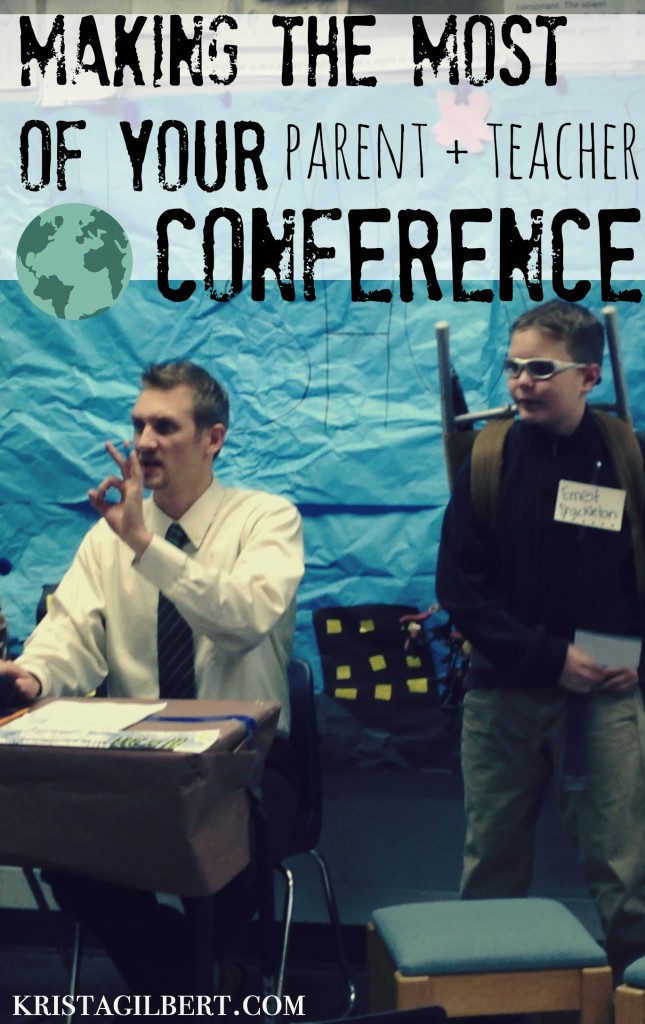November 7, 2013
 Chances are you are having a parent-teacher conference in the next couple of weeks, just like us! Here is an article I wrote for the fall issue of MomSense Magazine (a publication of MOPS International).
Chances are you are having a parent-teacher conference in the next couple of weeks, just like us! Here is an article I wrote for the fall issue of MomSense Magazine (a publication of MOPS International).
The chair creaked as I sat in my child’s desk, withholding the urge to organize the chaos of crayons, pencils, and paper. On the desk were examples of his latest work. Perusing them briefly, my main concern at this parent-teacher conference was not on academics, but centered on the social aspect of school. Was he okay at recess? Treating others well?
Tears filled my eyes as I listened to this remarkable teacher share what he had noticed about my son and what he was doing to breathe life into this child. Not only was he teaching him solid academics, but he was instructing about successful living too.
It is a gift when we have other adults invest in our children. The more people who sincerely love and care about them, the better. All of these positive influences join together to build who our kids are becoming. What better person than a caring teacher to have on our team in the effort?
When communication occurs between school and home, there is improvement in attendance, academic performance, and attitudes. The yearly parent-teacher conference is a prime opportunity to foster this partnership.
What is the best way to make the most of this time set aside for this purpose?
1. Ask Questions and Listen Well.
Make a list of questions ahead of time. These can range from school programs or policies, to specific questions about your student’s academic performance or social patterns. Mostly, give the teacher permission to be honest.
2. Assume the Best About the Teacher.
If your child is struggling, pause before blaming the teacher. Ask what you both can do to improve performance.
3. Decide What You Would Like to Share
Think about what would be helpful for the teacher to know about your child’s home life, personality, and talents/gifts. This is an opportunity for the teacher to learn from the primary teacher…. YOU!
4. Make a Plan For Progress
Chances are your child will have some strong areas, and other areas that could use improvement. Create an action plan with the teacher that can be implemented immediately. Decide how you will communicate with the teacher to track progress and how often.
5. Get Input from Your Student and Debrief
Ask your child if there is anything he would like you to discuss with the teacher. Also, debrief the conference. Share comments and any new action plans.
6. Identify the school’s policy about conferences for divorced or unmarried parents. Though it may be uncomfortable to be in the same room, some teachers do not have separate time slots for each parent. Keep the child and her progress as the central focus and concern, and do your best to put aside any personal conflict. If it isn’t possible to be in the same room as the other parent, consider a phone conference with the teacher instead.
7. Ask a councelor or an administrator to join if there is a struggle with the teacher. Neutral parties help diffuse differences and conflict. Allow them to help you and the teacher find a way to work together for the success of the student.
Questions to ask the teacher:
- Is my child working on grade level and having success academically?
- What do you see as my child’s strengths and weaknesses?
- How is my child interacting with others, both in the class and on the playground?
- What could I do at home to support my child’s learning?
- Is my child working up to his/her potential?
- What is the best way to contact you if my child is having an issue?

Comments